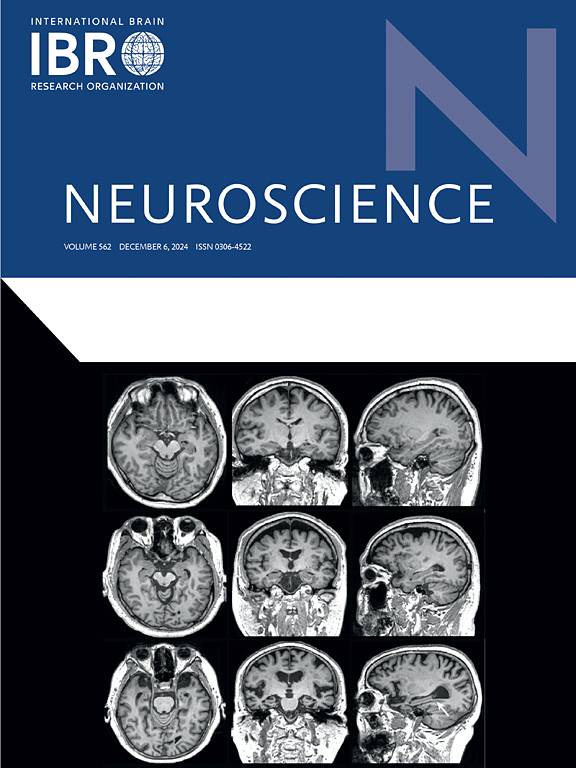Defective PINK1-dependent mitophagy is involved in high glucose-induced neurotoxicity
IF 2.9
3区 医学
Q2 NEUROSCIENCES
引用次数: 0
Abstract
Neuropathic pain often complicates diabetes progression, yet the pathogenic mechanisms are poorly understood. Defective mitophagy is linked to various diabetic complications like nephropathy, cardiomyopathy, and retinopathy. To investigate the molecular basis of hyperglycemia-induced painful diabetic neuropathy (PDN), we examined the effect of high glucose on the PTEN-induced kinase 1 (PINK1)/Parkin RBR E3 ubiquitin protein ligase (Parkin)-mediated mitophagy pathway in ND7/23 cells. Cells were treated with different glucose concentrations (25, 50, 75 mM) for various durations (24, 48, 72 h). Additionally, cells were exposed to high glucose (50 mM) with or without 100 nM rapamycin (a mitophagy enhancer) for 48 h, or transfected with PINK1 siRNA. We assessed protein levels of mitophagy-related genes (PINK1, Parkin, P62, LC3B) and apoptotic markers (cleaved-Caspase3) via Western blotting. High glucose significantly reduced the expression of autophagy-related proteins PINK1 and Parkin in a time- and concentration-dependent manner compared to controls. Rapamycin counteracted the inhibitory effects of high glucose on PINK1/Parkin-mediated mitophagy, while PINK1 siRNA transfection showed similar outcomes, confirming the inhibitory impact of high glucose on mitophagy. Moreover, high glucose induced apoptosis by suppressing PINK1/Parkin-mediated mitophagy, causing cytotoxic effects in ND7/23 cells which is derived from the fusion of mouse neuroblastoma cells and rat dorsal root ganglion (DRG) cells. Our findings suggest that hyperglycemia-induced disruption of the PINK1/Parkin mitophagy pathway impairs mitochondrial homeostasis, leading to apoptosis. Therefore, targeting PINK1 pathway activation or restoring mitophagy might be a promising therapeutic strategy for PDN treatment.
神经性疼痛常常与糖尿病并发,但对其发病机制却知之甚少。有丝分裂缺陷与肾病、心肌病和视网膜病变等多种糖尿病并发症有关。为了探究高血糖诱导的糖尿病痛性神经病变(PDN)的分子基础,我们研究了高血糖对 ND7/23 细胞中 PTEN 诱导的激酶 1 (PINK1)/Parkin RBR E3 泛素蛋白连接酶(Parkin)介导的有丝分裂途径的影响。用不同浓度的葡萄糖(25、50、75 mM)处理细胞,时间长短不一(24、48、72 h)。此外,将细胞暴露于含有或不含 100 nM 雷帕霉素(一种有丝分裂促进剂)的高浓度葡萄糖(50 mM)中 48 小时,或转染 PINK1 siRNA。我们通过 Western 印迹技术评估了有丝分裂相关基因(PINK1、Parkin、P62、LC3B)和凋亡标志物(裂解-Caspase3)的蛋白水平。与对照组相比,高糖以时间和浓度依赖的方式明显降低了自噬相关蛋白PINK1和Parkin的表达。雷帕霉素抵消了高糖对 PINK1/Parkin 介导的有丝分裂的抑制作用,而 PINK1 siRNA 转染也显示了类似的结果,证实了高糖对有丝分裂的抑制作用。此外,高血糖通过抑制 PINK1/Parkin 介导的有丝分裂而诱导细胞凋亡,并对由小鼠神经母细胞瘤细胞和大鼠背根神经节(DRG)细胞融合而成的 ND7/23 细胞产生细胞毒性作用。我们的研究结果表明,高血糖诱导的 PINK1/Parkin 有丝分裂通路破坏了线粒体平衡,导致细胞凋亡。因此,靶向激活 PINK1 通路或恢复有丝分裂可能是治疗 PDN 的一种有前景的治疗策略。
本文章由计算机程序翻译,如有差异,请以英文原文为准。
求助全文
约1分钟内获得全文
求助全文
来源期刊

Neuroscience
医学-神经科学
CiteScore
6.20
自引率
0.00%
发文量
394
审稿时长
52 days
期刊介绍:
Neuroscience publishes papers describing the results of original research on any aspect of the scientific study of the nervous system. Any paper, however short, will be considered for publication provided that it reports significant, new and carefully confirmed findings with full experimental details.
 求助内容:
求助内容: 应助结果提醒方式:
应助结果提醒方式:


